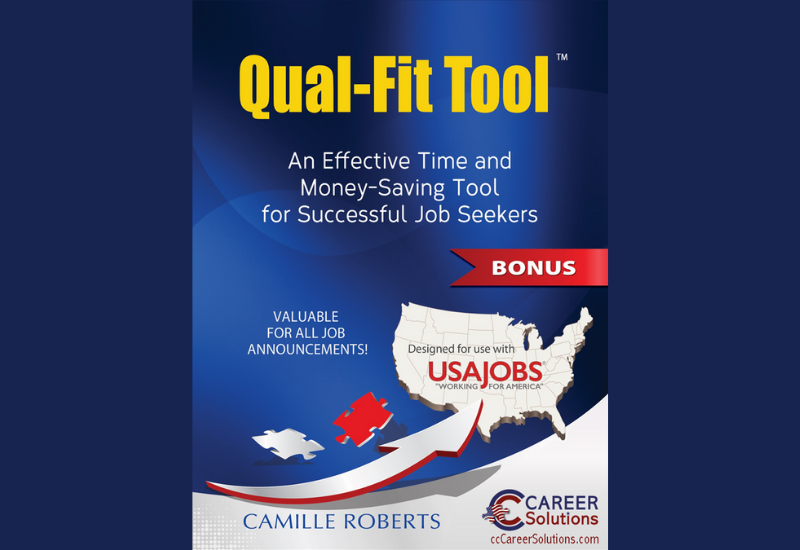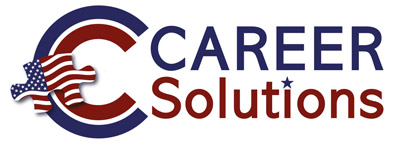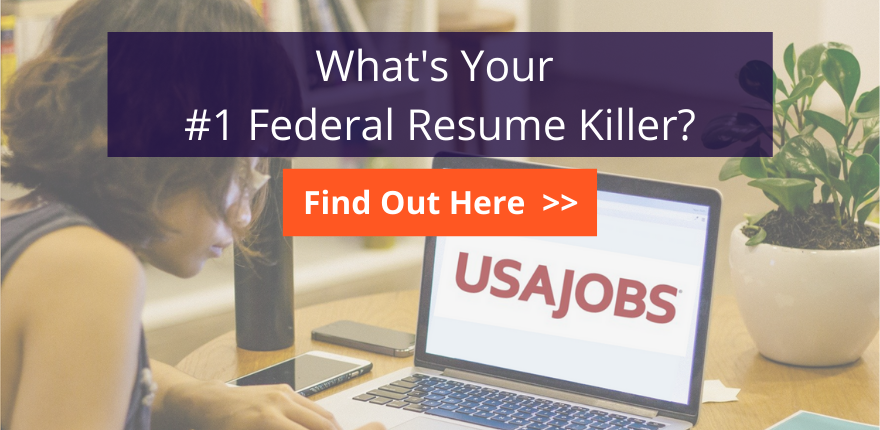So you’re ready to create your federal resume so you can apply for a federal job. You jump on the internet and find advice—all sorts of advice. In fact, all sorts of conflicting advice…and now you are confused as heck. But you decide to give it a go and next thing you know, you’ve gone down the rabbit hole reading everything you can find and try to incorporate all the advice into your federal resume.
Is your resume the result of any of the following advice?
- “Use ONE resume and stuff all the keywords you can into it and put all the keywords in white text fonts at the end of your resume. Make it look like one big block of text. That’s how I saw samples in a book.”
- “Try to get your resume to 3 pages. Add everything you can into your employment heading to make it as long as possible. If you can’t find a heading for something that doesn’t fit in employment, make one up to show your creativity.”
- “The fastest way in the door is to apply to jobs at the GS-5 or GS-7 level and work your way up. Write your resume to the lowest level.”
- “Use a hybrid resume without any dates, especially on your education. It’s just a way to discriminate.”
- “Don’t provide your GPA or salary. Make them ask you for it.”
- “Don’t add your high school. It’s too far back and no one cares.”
- “Apply to at least 25-50 jobs a week. The more the better. Someone is sure to bite.” (The person offering this advice had a goal to submit 500 applications ‘by August’ and it was June.)
- “Don’t waste your time customizing the whole resume. It’s only a machine that’s scoring it and all it cares about is keywords in the experience section.”
- “Don’t provide your supervisors or references until you have been offered the interview.”
- “Create your resume on USAJOBS and just input your information there.”
There is a lot more of this bad advice out there, but I’ll address these for now.
And if you have followed any of this advice, your resume likely doesn’t have any real strategy and won’t convey the value you offer—which results in no interviews, or job offers! And that could be why you’re here.
I have better advice for creating your federal resume.
If you’re tired of wasting time and you understand that time is money, this article is for you.
And here’s why: I have helped thousands of our clients land jobs and promotions in Federal Government for 25+ years in 400+ agencies. I’ve seen and heard a lot of bad advice and I have course corrected our clients’ resume strategies so they are successful in landing interviews—and ultimately, the job or promotion.
Here’s how.
Among the thousands of clients I’ve written resumes for, some of them are THE gatekeepers. Perhaps some of them will be reviewing your resume. I’ve written about what they do in their jobs, extracted their accomplishments, qualifications, and their value—and conveyed it in a way that captures and keeps their attention, as well as invites interviews! I’ve had copious conversations about their process, philosophy, experience, and what they NEED (not want) to get their job done. And I was one of the gatekeepers.
Many years ago, I connected the dots between each of the gatekeepers then added my technical strategies to develop the winning combination that gives the gatekeepers what they need, which makes it easy for them to keep your resume and application moving through the process. It’s one of the top reasons why our clients get hired faster. And when you make it easy for them, you WILL get hired faster!
This is why your resume isn’t all about you. It can’t be…if you want to be successful.

Here are 10 bad pieces of advice that I’ve read, my clients have told me, or that I’ve heard in video or audio broadcasts followed by my better advice.
1. Bad Advice: Use one resume and stuff all the keywords you can into it and put all the keywords in white text fonts at the end of your resume. Make it look like one big block of text. That’s how I saw samples in a book.
Better Advice: Definitely don’t make it one big block of text. Do you like reading one big block of text? Can you keep your place when going back and forth from line to line? Technology has come a long way. Make it easy for the gatekeepers to READ and learn about how you can solve their problems. If they aren’t compelled to read your resume, nothing else matters. It has to be easy to read, visually compelling, and customized to the job announcement.
And please don’t ‘keyword stuff.’ You’ll never win the interview with that strategy. Start by creating one resume targeted to one job announcement. Demonstrate how you meet each qualification. Identify and select the keywords then incorporate them into an accomplishment, preferably by demonstrating your knowledge in a key PHRASE. Make it easy for the gatekeepers to see what you do that stands out from thousands of other candidates.
2. Bad Advice: Try to get your resume to 3 pages. Add everything you can into your employment section to make it as long as possible. If you can’t find a heading for something that doesn’t fit in employment, make one up to show your creativity.
Better Advice: There is no need to make up headings. It’s important to follow best practices and use headings such as Key Qualifications, Accomplishments, Experience, Education, Job-Related Training, Publications, Organizations, and References. Don’t worry so much about resume length. Instead, focus your effort on showcasing how your knowledge, experience, education, and talents align with the qualifications and requirements of the job announcement. A strategically written resume will be more successful.
3. Bad Advice: The fastest way in the door is to apply to jobs at the GS-5 or GS-7 level and work your way up. Write your resume to the lowest level.
Better Advice: This one is the worst! Don’t EVER do this! Why would you apply to a GS-7 if you are qualified for a GS-11? Experience counts. Education counts. Training counts. Volunteering counts. And SO much more! Did you know it could take at MINIMUM, three to five YEARS to get promoted from a GS-7 to a GS-11—and that’s if you do EVERYTHING right.
Let’s say it takes five years and you are making $50,000 annually…just for a nice round number. Plug in your own salary. And let’s say you could be making $75,000+ annually. Multiply 5 years by $25,000 = $125,000. That’s $125,000 in salary that you missed out on…not to mention a setback in your retirement.

We created an essential tool to help ensure that you will apply to the right-fit, right-level jobs so you won’t miss out on any salary.
Imagine… no more wasted time applying to anything and everything. Instead, you can laser focus on the target so you can land the interview and stand out from the rest of your competition!
If you aren’t sure what level to apply to, schedule a consultation with us so we can help you! Our services are MUCH less than $125,000 and we’ll save you years and years of being in the wrong job! 😉
We have a client who followed the advice of starting low. She worked as a GS-7 for more than 10 years in a dead-end job and she couldn’t figure out how to convey her value on her resume. We helped her land a GS-9 in less than 90 days! She’ll progress much faster now using our strategies!

4. Bad Advice: Use a hybrid or functional resume without any dates, especially on your education.
Better Advice: NEVER use a hybrid or functional resume to apply to a federal job. Instead, use a reverse-chronological federal resume that speaks to each of the six gatekeepers. Put the month and year on your education, training, and volunteer service. Provide the starting month/year and ending month/year for every job, not just the years, as well as any other information requested in the job announcement. Failing to provide this information is one of the quickest ways to end up in the black hole.
Detail each job you have had, including accomplishments, for the past 10 years—even if you don’t think it is relevant. Gatekeeper #6 needs to account for your time and if you make their job easy, you’ll be successful…faster!
5. Bad Advice: Don’t provide your GPA or salary. Make them ask you for it.
Better Advice: Always put your GPA and salary on your federal resume. Don’t worry if you aren’t a 4.0 student. And don’t worry if your salary isn’t right in line with what is on the job announcement. Most people are making a move to increase their salary. It’s better that you include your GPA and salary to make it easy for the gatekeepers. They are going to find out anyway.
And honestly, in all the resumes I’ve seen over the past 25+ years, a lower than 4.0 GPA or different salary wasn’t a factor in any of my clients not getting hired. Instead, showcase your value on page 1 of the resume to capture the gatekeeper’s attention. There are solid strategies we can help you with for any scenario.
6. Bad Advice: Don’t add your high school. It’s too far back and no one cares.
Better Advice: This is simply not true at all for federal resumes. Someone does care—they have to. And, Gatekeeper #6 must know. So, you may as well make his or her job easier so you can get hired faster.
7. Bad Advice: Apply to at least 25-50 jobs a week. The more the better. Someone is sure to bite. (The person offering this advice had a goal to submit 500 applications ‘by August’ and posted his advice in June.)
Another person commented on this post and said, “it’s all a matter of trial and error and you need to submit as many applications as you can every single day until one day someone bites. Think of it like fishing. Throw the whole can of corn into the water. Maybe even a couple of cans. Some kind of fish will bite…eventually.”
Better Advice: No. Just no. Don’t do this. That is a horrible strategy. Instead of ‘eventually,’ you can be strategic, save yourself lots of time, and make it easy to get hired…faster! Narrow your search to THREE high-quality job announcements to start. Pre-qualify yourself. Ensure you meet or exceed the qualifications. Demonstrate your qualifications through your accomplishments throughout your resume.
We have created an essential tool for our clients to pre-qualify themselves. One of our clients valued the tool as priceless. She later said she would value the tool at least $12,000 because that’s the salary she could have made in one month in her new federal job. If you’d like to know more, participate in our workshop.
May I suggest it is wiser to change the bait you are using to attract the kind of fish you want?

8. Bad Advice: Don’t waste your time customizing the whole resume. It’s only a machine that’s doing the scoring and all it cares about is keywords in the experience section.
Better Advice: Take the time to customize your resume for each job announcement. The best way to do this is on page 1. Use key phrases and keywords throughout your experience, including your accomplishments. The humans—Gatekeepers 3, 4, and 5—will appreciate the time you took to do this and your score should reflect it. If you need help with the page 1 strategy, contact us. It’s one of our top strategies—and I promise—it’s a game changer!
9. Bad Advice: “Don’t give your supervisors or references until you have been offered the interview.”
Better Advice: It’s best practice to provide your supervisors and up to five references on your federal resume. Doing so makes it easy for the gatekeepers to select you for the interview. With that said, if you are in a confidential job search, you can leave off your current supervisor and state: “Confidential until job offer. Please contact me first.” If you leave off all your supervisors, that could raise a red flag. If you need help strategizing how to approach this for your situation, join our Boost Your Federal Resume Success group!
10. Bad Advice: “Create your resume on USAJOBS and just input your information there.”
Better Advice: Create your resume in Microsoft Word. Don’t name your resume: Resume.doc. Save each resume you create using this naming convention: FirstName LastName – Resume – Job Title.docx.
Example: John Doe – Resume – Budget Analyst.docx. Make your changes in your master resume file first, then take it to USAJOBS.
Recently, a client came back to me for an update to her executive federal resume. When we went to USAJOBS to build and upload the updated resume, her previous resume was missing. In fact, there was nothing in her account. It was as if she created a brand-new account. She contacted the HELP center and was told that happens once in a while and ‘to always keep a copy of your resume on your computer’. That could be a hard lesson, but luckily for her, I had a copy of the resumes that I had done for her.
Take charge of your single most-important career document—your federal resume (or private sector resume).
Don’t leave your career to chance. Give it the priority it deserves. Make a backup of your resume on a USB drive. Even print it out and put it in a file. It’s that important! You don’t ever want to have to start completely over.
Tired of wasting time and money?
If you are frustrated with trial and error…and trying to figure it all out on your own, work with us. You want your resume to get past all six gatekeepers so you can be selected to interview! I mean after all, time is money, right? And we can help you save a ton of money and make what you deserve.
You were not built to fail.
Our strategies have helped thousands of people land jobs in more than 400 federal agencies and in private sector.
We would love to help you make it easy for the gatekeepers to select you for those interviews and job offers…faster!
Are you ready to land interviews, a job, or a promotion?


